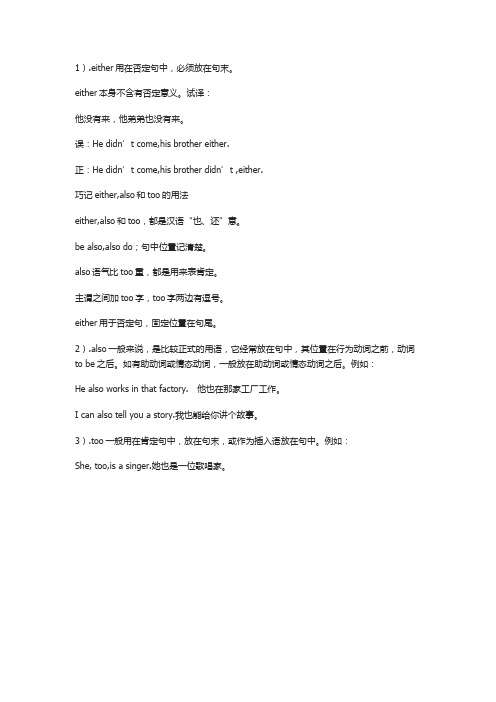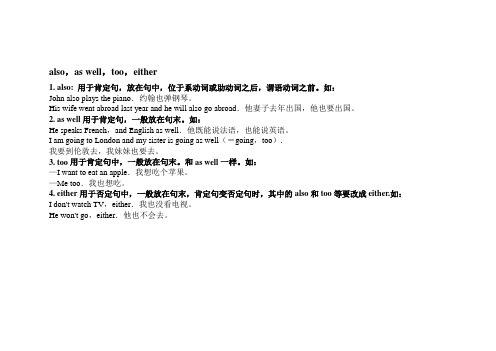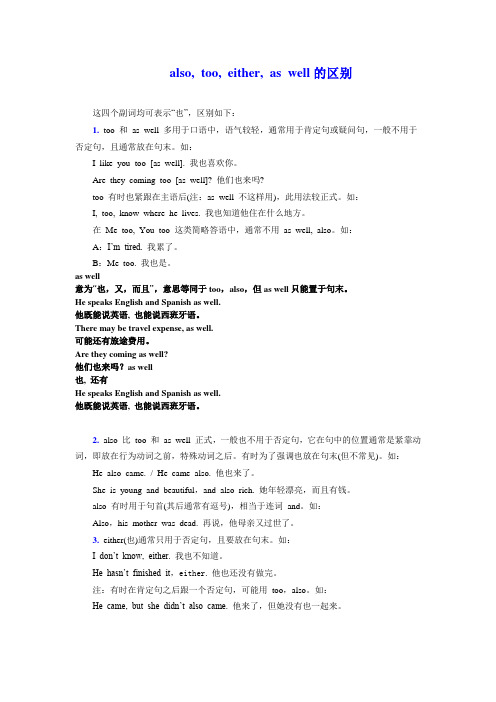either和too的区别
- 格式:docx
- 大小:38.99 KB
- 文档页数:1

tooalsoaswelleither的区别too also as well either的区别:too作为副词,意为太、过于,用于形容词和副词前;also作为副词,意为而且、也,放在行为动词之前,特殊动词之后;as well意为也、还,常位于句末;either可作代词和副词,意为任何一个、要么要么,常用于否定句,且放句末。
一、too的基本含义及用法介绍too作为副词,意为(用于形容词和副词前)太,过于,过度;也;又;还;(评说某事物使情况更糟)而且。
例句:He's far too young to go on his own.他年纪太小,不能独自一人去。
Can I come too?我也可以来吗?She broke her leg last week─and on her birthday too!她上星期把腿摔断了,而且还是在她生日那一天!I'm not too sure if this is right.这是否正确,我没有太大把握。
二、also的基本含义及用法介绍also作为副词,意为而且;此外;也;同样。
例句:She was not only intelligent but also very musical.她不仅聪明,而且极具音乐天分。
I didn't like it that much. Also, it was much too expensive. 我并不怎么喜欢它。
再说它太贵了。
She's fluent in French and German. She also speaks a little Italian.她的法语和德语讲得流利,也会说一点意大利语。
三、as well的基本含义及用法介绍as well意为也、还。
例句:They sell books as well as newspapers.他们既卖报也卖书。

Too, also, as well, either区别答:too, also, either, as well.这些“也”到底有什么区别呢?我们来看看下面的句子就明白了。
1) too放在句子末尾,通常用逗号隔开。
e.g: I am a student, too.我也是一名学生。
2)either在否定句中使用,但是放在句子末尾,通常用逗号隔开。
e.g: Lucy doesn’t go to the party, either.露西也没有去参加派对。
3) also则放在系动词be之后,实义动词之前。
e.g: I am also a student.我也是一名学生。
Li Ming also takes part in a ceremony.李明也参加了仪式。
4) as well 用在肯定句中,放在句子末尾。
e.g: Tony speaks Japanese as well.托尼也会说日语。
再举个例子:She has knowledge and experience as well.她既有知识,又有经验。
总之,too是肯定句中的“也”,either则是否定句中的“也”,放的位置都在句子末尾;also则是放在句中的“也”;aswell是放在句末的“也”。
【牛刀小试】根据汉语意思完成下面的句子(每空词数不限):1. She speaks French and German and a little Russian.2. I’ve read the book and I’ve seen the film, .3. Mary didn’t go there yesterday, and I didn’t go there, .4. He is going to London and his sister is going .【启发点拨】as well,also,too和either都可表示“也”,它们各自的用法如下:(1) as well常用于肯定句中,且位于句末;(2) also用于肯定句中,通常位于句中;(3) too用于肯定句中,通常位于句末,常用逗号和前面的部分隔开;(4) either多用于否定句中,常位于句末。

also too either as well的区别和用法(一)Also, Too, Either, As well的区别和用法1. Also•用法一:位于句首的also–用于强调一个陈述句,并提供额外的信息,相当于汉语中的“还有”–例如:Also, I will need your help with this project. •用法二:位于句中的also–用于强调句中的某个词或短语,强调方式更为突出–例如:I love hiking, and also swimming.•用法三:位于句尾的also–用于加强某个陈述句,并给出相似的事实–例如:She loves reading, also.2. Too•用法一:位于句尾的too–用于表示与前面陈述相同的情况或意见,相当于汉语中“也是”–例如:I am tired, too.•用法二:位于句中的too–用于强调句中某人或某物和其他人或物一样–例如:He, too, has a dog.3. Either•用法一:位于句尾的either–用于在否定句中表示两种选择中的任何一种–例如:I don’t like tea, either.•用法二:either…or…–用于表示两种选择之间的关系,相当于汉语中的“要么…要么…”–例如:You can either study or play games.4. As well•用法一:位于句尾的as well–用于表示除了前面提到的情况之外,还有另外一项–例如:I like cooking and gardening as well.•用法二:as well as–用于列举一系列事物时,表示“还有…以及…”–例如:He is good at playing soccer as well asbasketball.以上是also, too, either, as well的常见用法及区别。
通过合理运用这些词语,可以使你的表达更加准确明确。

1).either用在否定句中,必须放在句末。
either本身不含有否定意义。
试译:
他没有来,他弟弟也没有来。
误:He didn’t come,his brother either.
正:He didn’t come,his brother didn’t ,either.
巧记either,also和too的用法
either,also和too,都是汉语“也、还”意。
be also,also do;句中位置记清楚。
also语气比too重,都是用来表肯定。
主谓之间加too字,too字两边有逗号。
either用于否定句,固定位置在句尾。
2).also一般来说,是比较正式的用语,它经常放在句中,其位置在行为动词之前,动词to be之后。
如有助动词或情态动词,一般放在助动词或情态动词之后。
例如:
He also works in that factory. 他也在那家工厂工作。
I can also tell you a story.我也能给你讲个故事。
3).too一般用在肯定句中,放在句末,或作为插入语放在句中。
例如:
She, too,is a singer.她也是一位歌唱家。

also,as well,too,either
1. also: 用于肯定句,放在句中,位于系动词或助动词之后,谓语动词之前。
如:
John also plays the piano.约翰也弹钢琴。
His wife went abroad last year and he will also go abroad.他妻子去年出国,他也要出国。
2. as well用于肯定句,一般放在句末。
如:
He speaks French,and English as well.他既能说法语,也能说英语。
I am going to London and my sister is going as well(=going,too).
我要到伦敦去,我妹妹也要去。
3. too用于肯定句中,一般放在句末。
和as well一样。
如:
—I want to eat an apple.我想吃个苹果。
—Me too.我也想吃。
4. either用于否定句中,一般放在句末,肯定句变否定句时,其中的also和too等要改成either.如:
I don't watch TV,either.我也没看电视。
He won't go,either.他也不会去。

also, too, either, as well的区别这四个副词均可表示“也”,区别如下:1.too 和as well 多用于口语中,语气较轻,通常用于肯定句或疑问句,一般不用于否定句,且通常放在句末。
如:I like you too [as well]. 我也喜欢你。
Are they coming too [as well]? 他们也来吗?too 有时也紧跟在主语后(注:as well 不这样用),此用法较正式。
如:I, too, know where he lives. 我也知道他住在什么地方。
在Me too, You too 这类简略答语中,通常不用as well, also。
如:A:I’m tired. 我累了。
B:Me too. 我也是。
as well意为“也,又,而且”,意思等同于too,also,但as well只能置于句末。
He speaks English and Spanish as well.他既能说英语, 也能说西班牙语。
There may be travel expense, as well.可能还有旅途费用。
Are they coming as well?他们也来吗?as well也, 还有He speaks English and Spanish as well.他既能说英语, 也能说西班牙语。
2.also 比too 和as well 正式,一般也不用于否定句,它在句中的位置通常是紧靠动词,即放在行为动词之前,特殊动词之后。
有时为了强调也放在句末(但不常见)。
如:He also came. / He came also. 他也来了。
She is young and beautiful,and also rich. 她年轻漂亮,而且有钱。
also 有时用于句首(其后通常有逗号),相当于连词and。
如:Also,his mother was dead. 再说,他母亲又过世了。
"Still"、"also"、"too"、"yet"和"either"都是表示程度、范围、时间、条件等方面的副词,但它们的用法和意义有所不同。
1. "Still"表示持续的状态或程度,通常用于强调某种情况或状态的持续性,如:- She's still working on the project.(她仍在继续这个项目。
)- He's still not feeling well.(他仍然感觉不舒服。
)2. "Also"表示与前面的内容有关,但不是唯一的,通常用于列举或补充前面的内容,如:- I like swimming, also hiking and biking.(我喜欢游泳,也喜欢徒步旅行和骑自行车。
)- She's also a talented singer.(她也是一位有才华的歌手。
)3. "Too"表示某种情况或状态也适用于前面的人或物,通常用于加强前面的陈述,如:- I'm too tired to go out tonight.(我太累了,今晚不能出去了。
)- She's too busy to come to the party.(她太忙了,无法来参加聚会。
)4. "Yet"表示某种情况或状态还没有发生,通常用于否定句中,表示某种期待或希望,如:- I haven't seen him yet, but I'm sure he'll come.(我还没见到他,但我相信他会来的。
)- She's been studying hard, yet she still hasn't passed the test.(她一直在努力学习,但还没有通过考试。
also, too, either, as well的区别1、too 与as well 多用于口语中,语气较轻,通常用于肯定句或疑问句,一般不用于否定句,且通常放在句末。
如:I like you too [as well]、我也喜欢您。
Are they coming too [as well]? 她们也来不?too 有时也紧跟在主语后(注:as well 不这样用),此用法较正式。
如:I, too, know where he lives、我也知道她住在什么地方。
在Me too, You too 这类简略答语中,通常不用as well, also。
如:A:I’m tired、我累了。
B:Me too、我也就是。
2、also 比too 与as well 正式,一般也不用于否定句,它在句中的位置通常就是紧靠动词,即放在行为动词之前,特殊动词之后。
有时为了强调也放在句末(但不常见)。
如:He also came、/ He came also、她也来了。
She is young and beautiful,and also rich、她年轻漂亮,而且有钱。
also 有时用于句首(其后通常有逗号),相当于连词and。
如:Also,his mother was dead、再说,她母亲又过世了。
3、either(也)通常只用于否定句,且要放在句末。
如:I don’t know, either、我也不知道。
He hasn’t finished it,either、她也还没有做完。
注:有时在肯定句之后跟一个否定句,可能用too,also。
如:He came, but she didn’t also came、她来了,但她没有也一起来。
He went to Washington, but not to New York too、她去了华盛顿,但并不就是也去了纽约。
比较:He didn’t buy a computer, and she didn’t either、她没有买电脑,她也没有买。
me either 和me too的区别
me too表达”我也是“的意思,前面的话一般是肯定语气的句型。
me either可以单独用作答句,Me either =Neither do I=Me neither,意思是我也不,me either另一种用法是不单独用作答句。
me either 和me too的区别
1me either不单独用作答句的例句
He won't be too happy to see me either.
他不会高兴见我的。
Wasn't the first time he disappointed me either.
这也不是他第一次让我失望了。
I couldn't find a woman to go with me either!
我也找不到女人陪我看这部电影诶!
2me too的相关例句
Amy: Me too. I'm just thinking about the gift. Have you got any good ideas?
艾米:我也是。
但我还在想礼物。
你有什么好主意吗?
'I've got a great feeling about it.' —'Me too.'
“我感觉这次一定没问题。
”——“我也是。
”
A: No problem. Let's make it.Catch you later. B: Catch you. A: Me too.
A:没问题,我们走吧,待会儿见。
B:待会见。
A:我也是。
too与either的区别是什么?
either和too都可以当"也"讲,前者用在否定句中,后者用在肯定句中.
比如Lily likes fruit. I like fruit, too. 莉莉喜欢水果,我也是。
Lily doesn't like fruit. I don't like fruit,either.
1、 either表示二者之一。
We can go to either restaurant. I don't mind.我们可以去两家饭店中的任何一家。
我不再乎。
I haven't been to either of those restaurants.我没去过那两家饭店中的任何一个。
2、either 意思也是也。
它用于否定句中,而且要放在句末。
If you do not go,I shall not either.倘若你不去,我也不去。
3、too 表示“太”,有超出极限无法忍受之意。
It's too hot in the room. I can't stay here.房间太热了。
我简直呆不下去了。
4、too表示??也??还??而且,常表示与某人做同样的事,也常用于非正式语体或口语中。
too通常放在句末或单词、词组之后,其语气较轻。
在句子中,too用作插入语时,前后应用逗号隔开,此时too与also可以替换。
too放在句末,表示强调谓语或宾语,当too放在形容词、副词之前,其含义表示??太??过于,too的用法比also更多些。